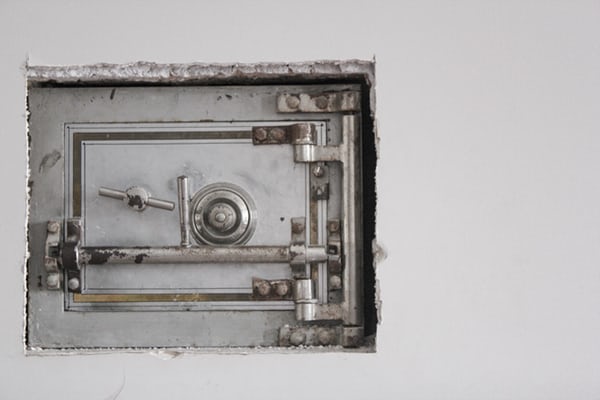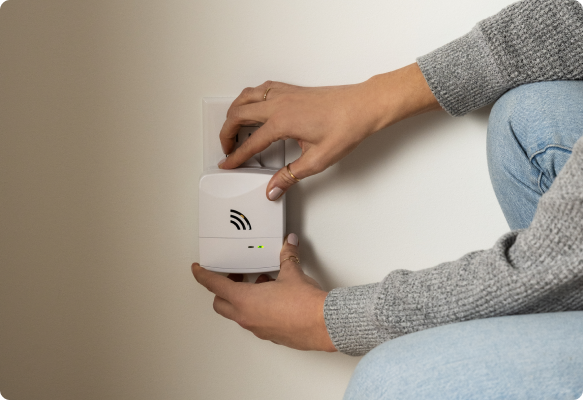Best Handgun for Home Protection
Link Copied
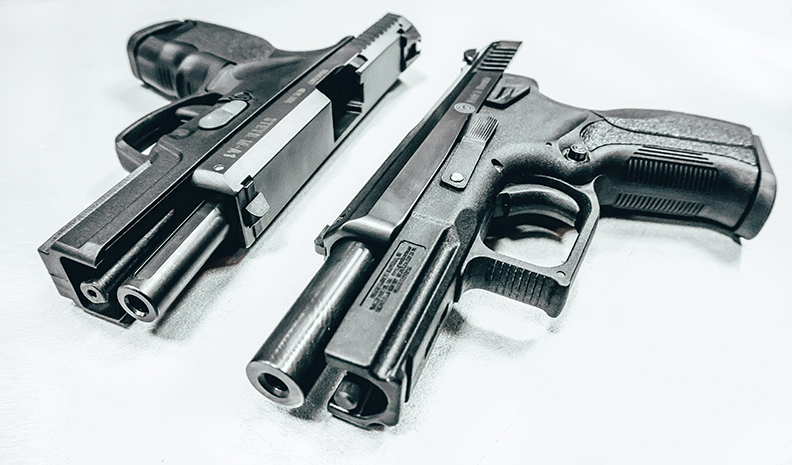
Your home is meant to be a safe haven that protects your family, your possessions, and everything that you truly care about. That’s why millions of homeowners install home security systems, put up fences, and lock their doors to protect their homes.
However, some homeowners feel safest with a handgun in the home, in case of emergencies. That being said, this article does not reflect a stance on gun control or gun usage. This article is meant to offer educational assistance for those looking to have a handgun in the home.
Handguns can offer protection, safety, and peace of mind when stored and used correctly and safely. This article will cover the reasons why you should (and shouldn’t) have a handgun in your home, gun safety laws and tips, and the ten best handguns for home protection.
How Does a Handgun Designed for Home Defense Differ From Other Handguns?
A handgun is a gun that can be held with one hand (two is better) without relying on the shoulder or other part of the body to held it steady for shooting, such as a shotgun or rifle. Their smaller size make them easier to store and use quickly in an emergency situation.
The two main types of handguns are revolvers and pistols. Both types are actually good choices for home defense use. However, there are a multitude of brands and types in each category to consider. It all depends on your personal preference and skills.
Revolvers are known for being dependable and simple to use. Pistols are known for their speed. But those are only general observations. Each handgun will be different, so it's best to go to a shooting range and try them out. The biggest takeaway is when choosing a gun, pick one you feel comfortable with because in an emergency, you have a very short time to respond.
All that said, a 9mm handgun is probably your best bet, as most people can quickly and easily handle that size and type of handgun, since they have low recoil. Plus, the ammo is reasonably priced making it more accessible to more homeowners.
Things to Consider When Getting a Handgun for Home Protection
There is a lot to know when it comes to guns. It can be overwhelming. If you remember one thing, we want to repeat this advice: try out a variety of handguns at a shooting range and see what you like. That's really what it's all about. A gun is a serious purchase, so you should feel comfortable with the feel in your hands and the way it feels when you shoot.
You may find that there are several that do the job and are good contentors for you. One thing to consider is the maker. Some of the top makers:
- Barrett Firearms
- Benelli
- Beretta
- Browning Arms Company
- Colt Defense
- FN Herstal
- Glock Ges.m.b.H
- Heckler and Koch
- Mossberg
- Remington Outdoor
- Savage Arms
- Smith & Wesson
- SIG Sauer
- Springfield Armory, Inc.
- Sturm, Ruger & Co.
- Winchester Repeating Arms
If there are any gun makers are familiar with or are interested in researching, that's a good starting point. As you start learning and trying different ones out, you'll begin to notice the differences. And once you narrow down your choices, spent more time trying them out at the shooting range. It's possible that your second or third impressions will be a little different than your first impressions. Which one feels like it is a best fit for you?
Caliber…is Bigger Better?
What is caliber? For firearms, it's the diameter of the bore (the inside portion of the gun barrell). It usually measured in hundredths of an inch or in millimeters. That's why a "22" (.22 inches) and 9mm may sound familiar to you.
In general, a higher caliber gun is more powerful, and therefore, gives more kick when it's shot. The higher and powerful the gun, the bigger the bullet, which is capable of doing more damage. But it doesn't necessarily mean that bigger caliber is "better."
Actually, most experts recommend that those just getting into guns should go with a lower caliber gun. They are easy to manage and can offer protection when you need it. When it comes down to it, it's all about comfort and confidence. In a home invation situation at night, for example, you want a firearm you can access and use quickly and easily.
When it comes to choosing a firearm for home protection, we suggest looking closely at 9mm handguns.
Ammo: Hollow Points vs Regular Rounds
Another thing to consider is the type of ammo you need. There are two types of bullets: hollow-point and regular rounds (full-metal jacket or FMJ).
A hollow-point looks like how it's named: hollow at the point of the bullet. Because of how it is designed, once it enters something it expands. For example, on impact of a person, it will expand and cause more damage to the organs it hits.
A regular round is what most people know of as ammo. The biggest difference with this type of cartriage is that it doesn't expand or distort (unless it hits something hard at close range). So, if it enters a human body, the bullet will usually stay intact and either remain in the body or exit out the other side.
So which one is better? One thing to realize is that hollow-point ammo is more expensive, so that may deter some from choosing it. Overall, the opportunity for stopping an intruder is going to be slightly higher with hollow-point bullets, since they are more likely to do damage. Still, regular ammo is a good choice as well since it too can be lethal and you can shoot several times if needed.
How to Choose a Beginner Handgun
Now that you know some basics, you probably want to get into the shooting range to try out some handguns. Before you go, however, bring this list with you. When choosing a beginner handgun, it's important to keep the following things in mind.
Fit
A small woman with small hands needs a different gun than a large man with large hands. If the firearm is a bad fit, it's going to be really hard for you to use. So make sure that fit is a top priority.
For most average-sized beginners, a full-size handgun with a 5" barrel is easy to handle, since it has a good mass that absorbs the kick. For home defense, this is good contendor. If you eventually want to conceal carry, however, you'll probably want something smaller.
Again, the best way to determine fit is to try out different guns. Head to a local shooting range and ask for assistance.
Safety
There are different "safety" options with firearms, so it's important to consider which one that works best for you.
A handgun with a trigger safety or a grip safety are recommended for most beginners, because they are built in.
If you are purchasing the handgun for self-defense, it is recommended that you avoid a handgun that has a manual external safety. In the heat of the moment where you need to use your gun in defense, you could forget to disengage the safety. However, as a beginner, you may feel more comfortable with a handgun that has an external safety, so if that is what you feel most comfortable with, then stick with it. Keep in mind that the user makes the gun operate, so if you are safe, competent, and aware of what you are doing while in possession of the firearm, your gun will be safe to carry with or without a manual external safety.
You may want to consider a handgun with a trigger safety, where the finger must depress the paddle on the trigger in order to fire the gun. Another type of safety to consider is the grip safety that is integrated onto the backstrap of the gun. This safety needs to be squeezed in order to disengage and allow the gun to fire.
Sights
The gun's sight is where you look through to focus on a target. For home protection, consider possible scenerios. If a home invasion happens at night, you'll want more assistance from the sight on the gun. Consider night sights which help you aim in dimly lit situations. The handgun you choose may have a recommended night sights or you can also purchase an "aftermarket" sights that can be installed for you by a gunsmith.
Action
When referring to "action" on a firearm, it can mean a few different things:
-
The action of the cartridge from loading, to firing, to ejecting (bold-action, lever-action, pump-action, break-action, semi-automatic and automatic). For home defense purposes, semi-automatic is a good option. It reloads itself between each shot, so you don't have to take precious moments to reload manually.
-
How to put ammo in (break-action, bolt-action, lever-action, etc.). Most of the time, these types of actions are referring to rifles and shotguns, rather than handguns. So typically they don't apply to home defense handguns.
-
The type of trigger (single-action, double-action, double-action only, striker-fired). See the next section for info on trigger types.
Ergonomics & Trigger
Ergonomics means the firearm design with the user in mind. When choosing a handgun for home defense purposes, you want it to fit in your hands well, not cut into your fingers, and be easy for you to reach and use all the features.
This goes hand-in-hand with the tigger, as you'll want one you feel comfortable pulling. In an emergency situation, you need the confidence to shoot when needed.
The types of triggers are single-action, double-action, double-action only, striker-fired. For home defense, most experts recommend looking into striker-fired options. The benefit is that every time you pull the trigger, it will have less resistence and will feel the same pretty much every time.
Price Range
For most people, price is going to play an important part of which handgun they choose. When shopping for handguns for home defense, you're looking at spending around $400-600 and up, depending on all the bells and whisltes.
Accessories
Think of handgun accessories as ways to customize it for you. We recommend getting a light for better use in dimly lit situations. Other options to consider are different grips, lasers, suppressors, etc.

Pros of Having a Gun in Your Home
Depending on how the homeowner feels about gun ownership, owning a gun can feel like a necessity. By storing a gun in the home, it may decrease the chances of burglary and increase feelings of safety and security. Here are the pros of having a gun in the home:
Decreased Odds of Burglary
According to the FBI Crime Reports, there are over 1.5 million burglaries reported every year. In some cities, such as Bastrop, Louisiana, the odds of being burglarized are 1 in 30. No one wants to imagine an unwelcome intruder entering the home, whether or not the family is present. Burglaries are common in the United States, with 4,500 burglaries every day. According to crime data, 38 percent of assaults and 60 percent of rapes occur during home invasions.
Typically burglars will avoid entering a home while the family is home in order to decrease the risk of crime witnesses. Gun owners who place warning signs on the window are less likely to be targeted for burglary, especially if the burglar thinks there’s a chance the homeowner is in the house.
Peace of Mind
Perhaps the greatest benefit of having a gun in the home is that it may provide peace of mind for the homeowner. If the homeowner is acquainted with guns and knows how to use them properly, the gun acts as a safety tool meant to protect loved ones during an emergency. Handguns in the home, when stored safely, allow homeowners to believe in their personal security. One of the most important aspects of home security is the ability to feel secure.
Confidence
Owning a gun in the home can also help the homeowner to feel more confident in their ability to protect. Homeowners who know how to safely use a gun often feel safer in their neighborhood. Homeowners who own guns should regularly attend gun ranges to practice using the weapon. Guns become dangerous when they are owned by people who don’t know how to use the weapon, or when owned by those who don’t know how to secure the weapon when it is not in use. However, when wielded by a responsible member of society, the gun can add to the person’s confidence.
Responsibility
Having a gun in your home forces the homeowner to be responsible. However, in some cases, having responsibility could also be a con. Homeowners who appreciate the feel of responsibility will enjoy having a firearm in the home. Paired with confidence and peace of mind, homeowners will be able to stand with their chins held high, knowing that they are prepared for the worst.
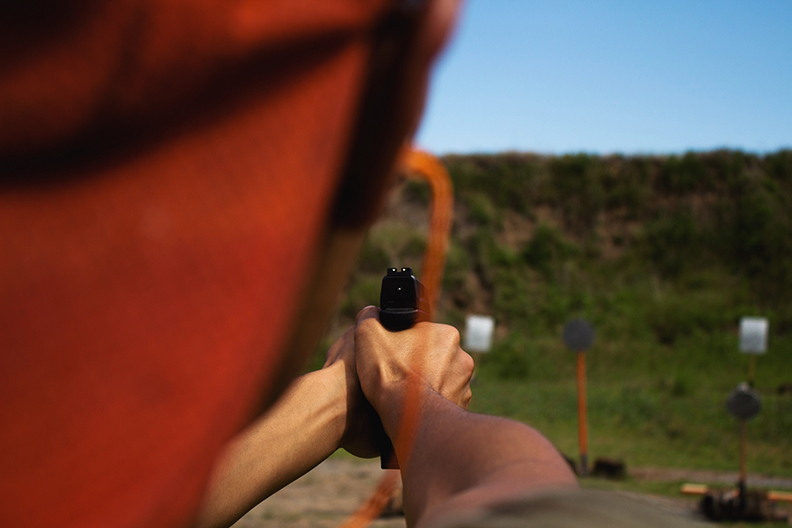
Cons of Having a Gun in Your Home
On the other hand, guns are guns. They are weapons that can be abused. Because gun ownership has cons, homeowners should consider these risks before committing to owning a gun:
Increased Risk of Gun Violence
Irresponsible gun owners have a greater chance of gun violence. Owning a gun requires personal responsibility and physical discipline. When a gun owner is unable to think clearly or find themselves often intoxicated, owning a gun can be an extremely dangerous decision. Additionally, as a weapon, guns are unable to pick and choose who holds it. This means that if the gun isn’t safely locked and stored away, a home intruder may find the gun before you and use the weapon against you.
Putting Children at Risk
Gun owners with children may be putting their families at risk. Children often don’t understand the dangers of using a gun improperly. Because of this, if the child is able to access the gun, they might feel tempted to show the gun to their friends as a way to “show off.” It’s not hard to imagine why this would create a dangerous situation.
Guns can also put teenagers at risk. Teenagers are often unable to think clearly, especially if they are faced with depression and anxiety due to bullying at school. With an unstable teenager, guns may become a way to escape their lives, or a way to punish their bullies at school. According to the CDC, gun suicide is the third leading cause of death for teenagers. Guns should be stored in a gun safe to prevent children and teenagers from gaining access to them.
Forced Responsibility
For some, responsibility is a negative. Having a gun in the home forces homeowners to be responsible for the gun. If someone was able to use the gun inappropriately, the gun owner would feel responsible. For those who are not prepared to handle the weight of responsibility, this burden may be too much. Homeowners should only consider owning a weapon if they are prepared to securely store the item and take responsibility if the weapon is used poorly.
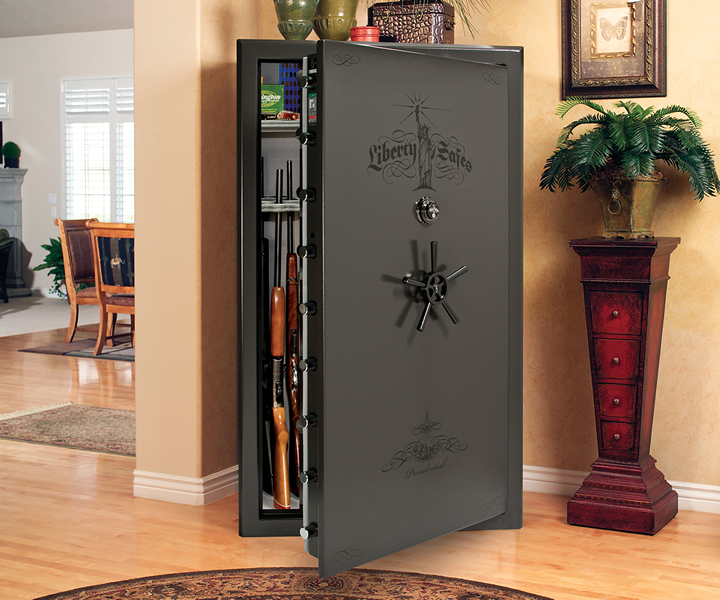
How to Safely Store a Gun
Safe gun storage is one of the most important decisions homeowners can make. Gun storage can help to provide safety to your family and omit many of the cons of owning a gun. According to Amy W. Anzilotti, MD, a well-known gun safety specialist, guns should be stored in locked cases such as gun safes.
Gun safes are specially built to protect your guns from water damage, rust, corrosion, and damage while also preventing others from using the gun. Gun safes may use a traditional combination lock, an electronic keypad, or a biometric lock to secure the gun. The type of gun safe that homeowners use to protect the gun matters less than the fact that the gun is locked away.
For single handguns, homeowners can also use a lockbox to secure the firearm. Lockboxes are small gun safes and are made of steel. Lockboxes are also portable, making it easy to carry the lockbox away from the home when needed. The lockbox will be just as efficient in protecting the handgun as a gun safe.
When storing a gun, homeowners should store the ammunition in a separate location, if stored in a lockbox. The gun itself should be entirely unloaded when stored away. If using a lockbox, the lockbox should be hidden out of sight in a location where a burglar or home invader is unlikely to find it.
Homeowners should never keep a gun under their pillow, in the nightstand, or under the mattress. An unfortunate event occurred on February 10, 2020, when a gun kept under a pillow went off in the middle of the night. A three-year-old child was killed in her father’s bed due to the freak accident. According to the news report, the father of the child told the police “he kept the gun under his pillow because people were out to get him.” Guns should only be stored in locked cases in order to prevent the weapon from harming those living in the home.

Gun Ownership and Safety Laws
Some states have specific requirements for ownership, meaning that laws may vary from state to state. However, federal gun laws remain consistent from state to state. According to federal gun laws, the following people cannot own a gun in the United States:
- People who have been convicted in the past for a felony.
- People who have been convicted of a misdemeanor or domestic violence.
- People who are fugitives from justice.
- People who are unlawful users of illegal drugs and substances.
- People who are underage.
- People who have been dishonorably discharged from the military.
- People who have renounced their US citizenship.
Federal gun laws are meant to ensure that guns are used safely by responsible individuals. Irresponsible individuals and individuals who have proved themselves incapable of using a gun correctly in the past, according to the federal gun laws, are not allowed to own a gun. They are not allowed to buy a defensive handgun or have a concealed carry permit. If an individual who is not allowed to own a gun is found with a gun, law enforcement will have no choice but to escort the individual to prison for violating gun laws.
Some states require guns to be locked in a secure container when the gun is not in use in order to ensure that guns are stored safely. All states require citizens to have a concealed carry permit if the person wants to carry the gun outside of the home. However, most states allow homeowners to own a gun in the home without a permit.
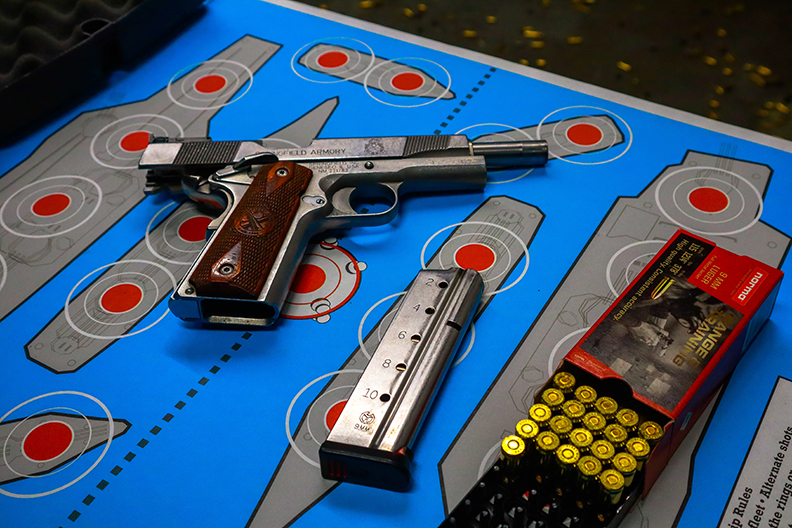
Top 10 Handguns for Safety
If you’ve decided that you would feel safer and more secure with a gun in your home, it’s important to know which options would be the best for home protection. For home protection, a rifle or other large gun wouldn’t be the best option since you would need more storage space. A rifle is also harder to conceal and hide inside the home. Because of this, a smaller gun would be a better option (since finding an appropriate safe or lockbox would be an easier task). For homeowners looking at guns for home protection, handguns are the better choice. Here are the top 10 best handguns for home defense.
1. Glock 19
The number one thing that a homeowner should look for in a handgun is reliability. The Glock 19 Pistol is a reliable handgun meant to protect. It ranks as the number one best gun for home protection. This pistol is often carried by law enforcement because of the reliable nature of this weapon.
The Glock 19 is a striker-fired, semi automatic weapon with limited recoil. It is also ideal for new gun owners (or those with gun experience) since it lacks an external hammer or manual safety. The pistol has a 15-round magazine and allows users to easily load ammo into the weapon. The gun takes 9mm ammo, which makes it easy to find new ammo for the pistol. Typically, you can find this gun for $499.99 or higher.
2. Smith and Wesson M&P
Smith and Wesson is a well-known and respected gun brand. The brand boasts of their reliability, and their guns back up the boast. S&W guns are known for being extremely reliable, making them ideal for home protection—since the last thing you want is for a gun to fail you during a home invasion. The brand offers a lifetime warranty for every gun as well as a lifetime service policy.
The M&P model (Military & Police) comes in three different calibers, offering a caliber choice to the buyer. For protecting your home, we recommend the 9mm caliber design. However, this gun may be tougher for a first-time gun owner since disassembly is more difficult. You can find this pistol for a price of $524.99 or higher.

3. Sig Sauer P320
The Sig P320 is the official handgun choice for the US Army. The gun has earned a 30-year contract, replacing the old contract of the Army’s Beretta M9 pistol. Due to the new contract, the gun has become popular among police and other law enforcement officials. Unlike most Glock pistols, the Sig P320 isn’t standardized, meaning that buyers have a wider variety of features and caliber options.
The Army chose the Sig P320 mainly because the gun is easy to use and easy to clean. It also has an attractive design and an easy grip. This gun can be used by experienced gun owners or new gun owners. However, the weapon weighs in at 1.85 pounds, making it heavier than many other options. This gun can be bought for $599.99 or higher.
4. Glock 17 Gen 4
Glock 17 is one of the best options for home protection. A variation of the Glock 17 is used by the Federal Bureau of Investigation and has a 10-year contract with the FBI. The firearm is a full-size service pistol with a 9 x 19 mm cartridge (9 mm caliber). Because the pistol has a full-sized grip, those holding it can easily control and aim the weapon without worrying about the gun being knocked from their hands.
Homeowners looking to protect their homes with more accurate and effective shots will choose the Glock 17. Glock Gen 4 is a great option to give homeowners control and precision. Typically, the Glock 17 can be found for $539 and higher.
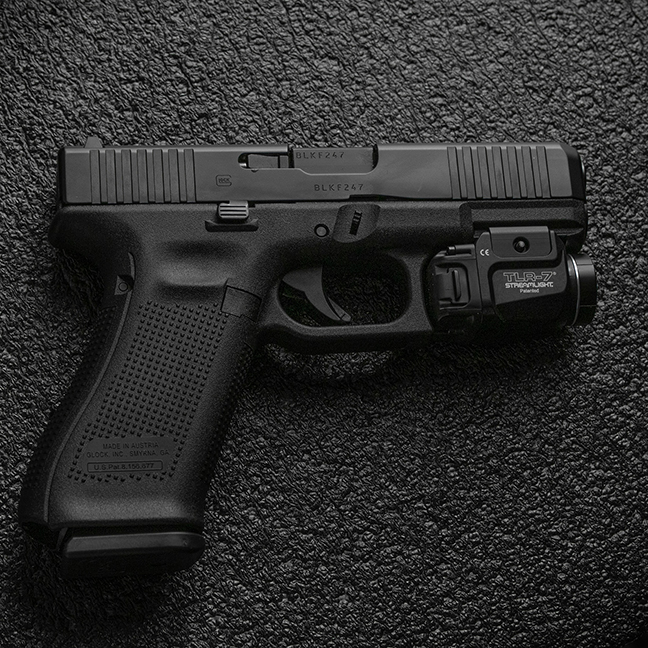
5. Heckler & Koch VP9
At the number five spot is the Heckler & Koch pistol. Most 9mm caliber pistols have recoil that takes new gun owners off guard. However, the Heckler & Koch uses a unique gas retardation system that balances the recoil, making the recoil of the pistol easier to manage.
The pistol weighs 1.6 pounds and has a sleek, attractive design. The controls on the Heckler & Koch are ambidextrous as well, making it possible for both righties and lefties to use this gun without a hassle. With the Heckler & Koch, gun owners will get 15+1 rounds and interchangeable backstraps. Additionally, the gun is easy to aim thanks to the well-acclaimed front sights. Of the semi automatic handguns, this pistol is a great choice. However, gun owners should expect to pay more for quality. This pistol can be found for $668 or higher.
6. Ruger SP101 .38
The Ruger SP101 is the first revolver to make the list of the best handguns for home protection. This revolver is known for power and can handle both 357 Mag and 327 Federal Mag cartridges. This double action revolver is perfect for gun owners who want to have both power and control. This Ruger has a barrel length of 2.25 inches (5.7 cm) metal frame. This Ruger revolver is a small frame revolver.
This gun is also a great conceal carry weapon since it is a small frame revolver. Additionally, the revolver has seen some complaints about sticky trigger pull. However, many buyers have commented that the trigger will become less stuck as the gun is used. Another con of the Ruger revolver is that it only has a five-round capacity. The Ruger revolver can be found for $549 or higher.
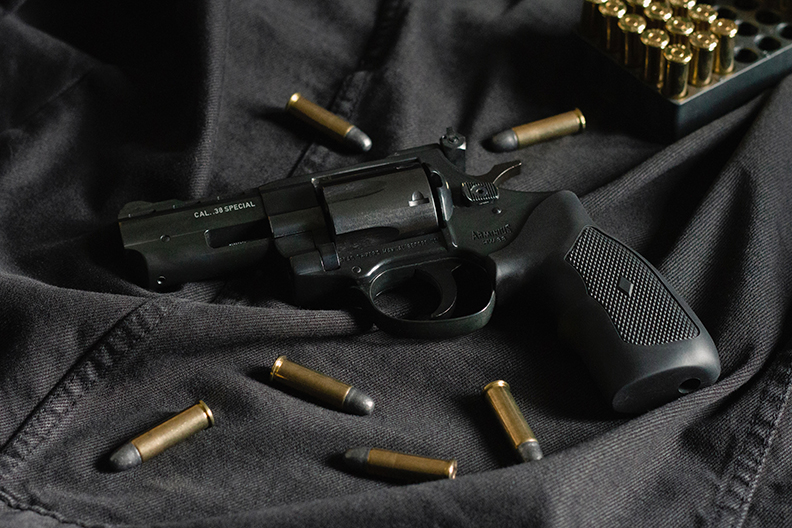
7. Beretta M9A1 Pistol
Beretta was the previous gun-of-choice for the FBI. Currently, the Beretta M9 is the gun chosen for the US Marine Corps. This gun has a three-dot sight and night sights. This semi auto gun has a barrel length of 4.9 inches (12.44 cm) and weighs 2.1 pounds (33.9 oz).
The main drawback of the Beretta is the weight. However, if you’re using the gun as a firearm for home protection, you won’t have to worry about carrying the gun around in a waistband. Since this gun weighs more than the average pistol, the gun owner should practice shooting at a gun range to get used to the weight. For a concealed carry weapon, this firearm is not ideal. Buyers can find the Beretta M9A1 for $750 or higher.
8. Glock G41 G4
The Glock pistol is one of the best firearms for home protection, so it’s not surprising that another Glock has made it into the top ten list. The Glock G41 G4 has a sleek polymer frame and is a perfect gun for a concealed carry firearm. Shooting the Glock G41 G4 is easier since the gun was made for balance. It has a two sights radius and a no-stick trigger.
The Glock G41 G4 has interchangeable backstraps, a hollow point barrel, and a proven grip frame. It is a striker fired gun and is great for all gun users. The Glock is lighter than other models and weighs in at 1.5 pounds and uses 45 ACP ammo. The barrel is 5.31 inches (13.5 cm), making the gun extremely accurate. Buyers can find this gun available for $626.99 or higher.
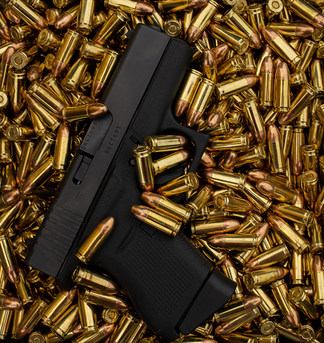
9. Sig Sauer P226 MK25
Sig Sauer is a reliable brand that offers reliable 9mm pistols for a variety of reasons. This specific Sig is the official gun of the US Navy Seals, meaning that the gun is a reliable choice. The pistol is balanced, with an easy, stylish grip and time-tested controls.
The Sig P226 has a red dot sight that makes aiming easier in the daytime or nighttime. The red dot sight is the lightest and smallest sight offered by Sig Sauer, yet just as effective. The gun is also motion-activated, making it one of the highest-tech guns available. Interested buyers can find this gun for $1,049.99 or higher.
10. Ruger GP100
The Ruger GP100 is the tenth best choice for home protection. This handgun is a simple, perfect option for first-time gun owners. It has a thumb safety, an easy grip, and a low recoil. This double action revolver is comfortable to shoot. The revolver has a built-in transfer-bar mechanism to protect the shooter against accidental discharge. It also offers easy maintenance, easy reloading, and is compact. This revolver could be used as a concealed carry.
However, as a revolver, this firearm has a low round capacity. The Ruger GP100 has a round capacity of 6 rounds. The length of the firearm is 8.5 inches (21 cm) and weighs 2.25 pounds. Since the revolver is metal rather than polymer, the gun is heavier—a downside for those wanting to tote the gun as a concealed carry. This gun can be bought for $599.99 or higher.
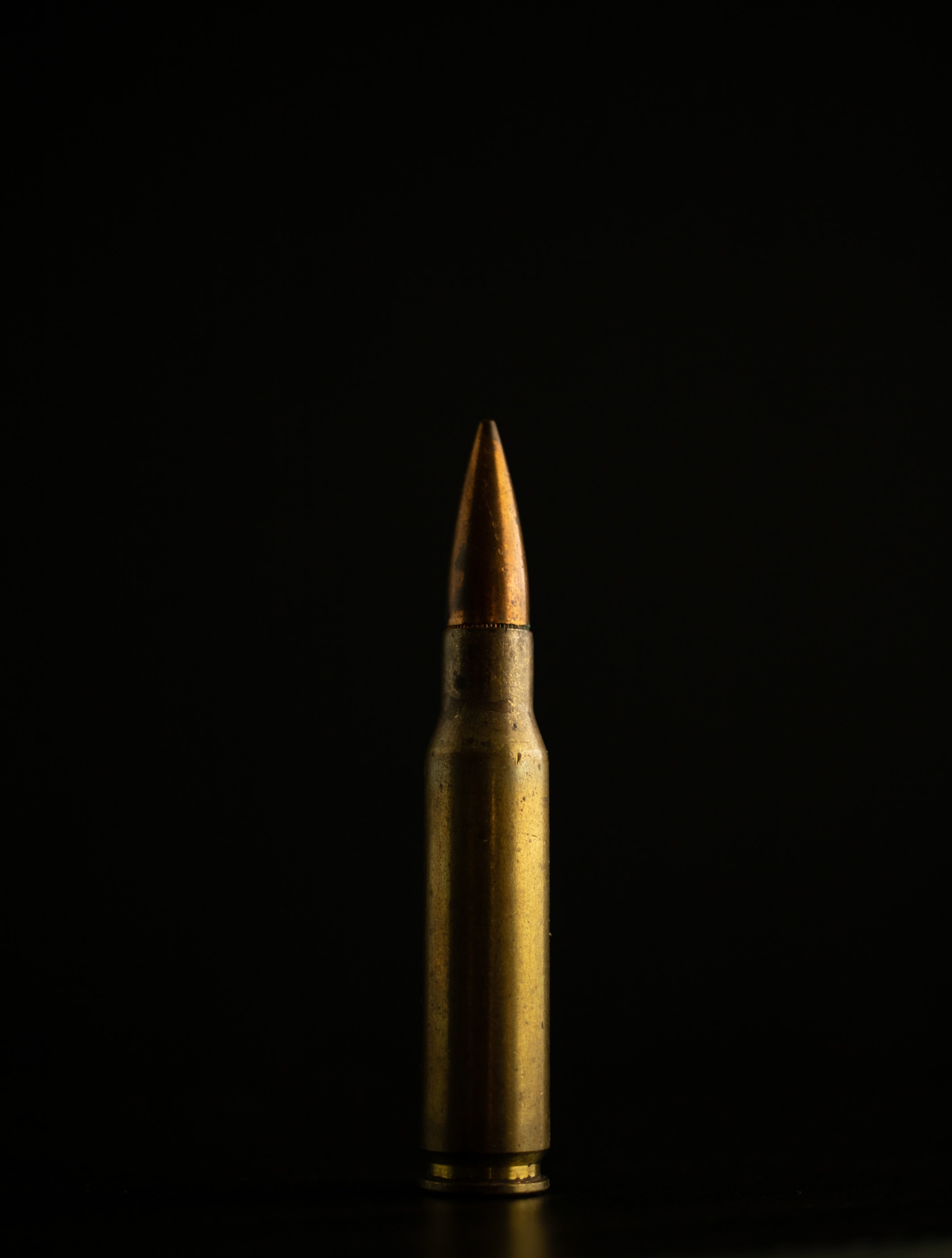
Additional Handgun Accessories and Consideration
While not necessary for the funtion of the handgun, accessories can add extra features that make it easier to use, helps you shoot more accurately, and customize it for you.
Weapon-Mounted Light
This is a must-have for home defense handguns. If a burgler comes into your house and has a weapon, you could be in serious danger. In a dark room this can go from bad to worse. Having a handgun for self defense is effective only if you know what or where you're shooting. Having a weapon-mounted light will help you identify who the purpotrator is (or if it's a friend or family member you thought was an intruder), so if they get away you can describe them to police.
Red Dot Optic
This accessory helps the handgun user to aim more effectively. It actually works by showing a reflection and when the red dot appears, it's aligned correctly.
Extended Magazine and Magazine Extensions
A magazine for your handgun can only hold so mucha ammo. An extended magazine or magazine extension does just like it sounds: it offers extra space so you can add extra rounds. It's a matter of preference but is a great option when you want to be able to shoot more rounds without replacing the magazine.
Suppressors
Suppressors change how the bullet is fired so that it is quieter. If you've ever shot a gun, you know how loud they can be. That's why in a shooting range, you wear ear protection. Since you won't be using ear protection in a home invation situation, a suppressor is a good option to safe your ears.
Compensators
This accessory helps to reduce the recoil and muzzle rise, making any further shooting more level because there's less movement.
Ammunition Selection
As discussed in an earlier section, there are two types of bullets: hollow-point and regular rounds (full-metal jacket or FMJ). Hollow-point expands once it hits a target, meaning it can cause more damage to a human, but this ammo is more expensive. FMJ bullets typically stay intact, plus they cost less. It's really personal preference, but for training FMJ bullets make more sense budget-wize, and hollow-point has the potential to stop an intruder more quickly, depending.
Train, Train, Train
Guns are weapons, and gun owners need to be responsaible. Always spend time training with your firearm so you are comfortable using it, but also so you are educated and can be as safe as possible with it. When you first own a gun, go through a training program at your local shooting range. Then return regularly to keep up on it.
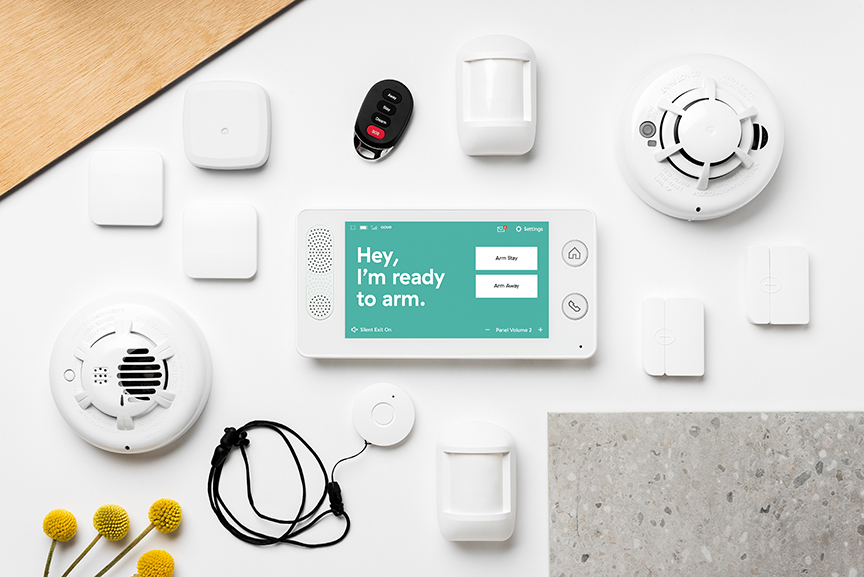
Other Ways to Protect Your Home
Using a handgun isn’t the only way to protect your home. For homeowners who might feel uncomfortable owning a gun, here are several other options that will provide security, protection, and peace of mind without housing a weapon in the home:
Install a Home Security System
All homeowners, regardless of whether or not they have a gun stored in the home, should have a home security system installed. Home security systems are considered to be one of the best ways to protect homes from home invasion and burglary. The sole purpose of a home security system is to protect. They offer alarms that can be placed at every entrance in order to prevent an intruder from getting inside the home and cameras that will record during the day and night. According to studies, 60 percent of burglars will avoid entering a home if there is a home security system. If a burglar chooses to enter the home and an alarm is triggered, almost 100 percent will turn and run.
Burglars want to avoid getting caught at all costs. When a burglar is caught, they may face up to five years in prison and a fine for each item they attempted to steal. The costs of getting caught are high, making burglars highly motivated to avoid cameras and alarms. Burglars are also known to target homes with easy escape routes, tall bushes, and obscuring landscaping.
Installing a home security system will deter 60 percent of burglars from targeting your home. With a home security system, homeowners won’t have to worry as much about defending their home using a firearm since the security system will do the work of deterring criminals for them.
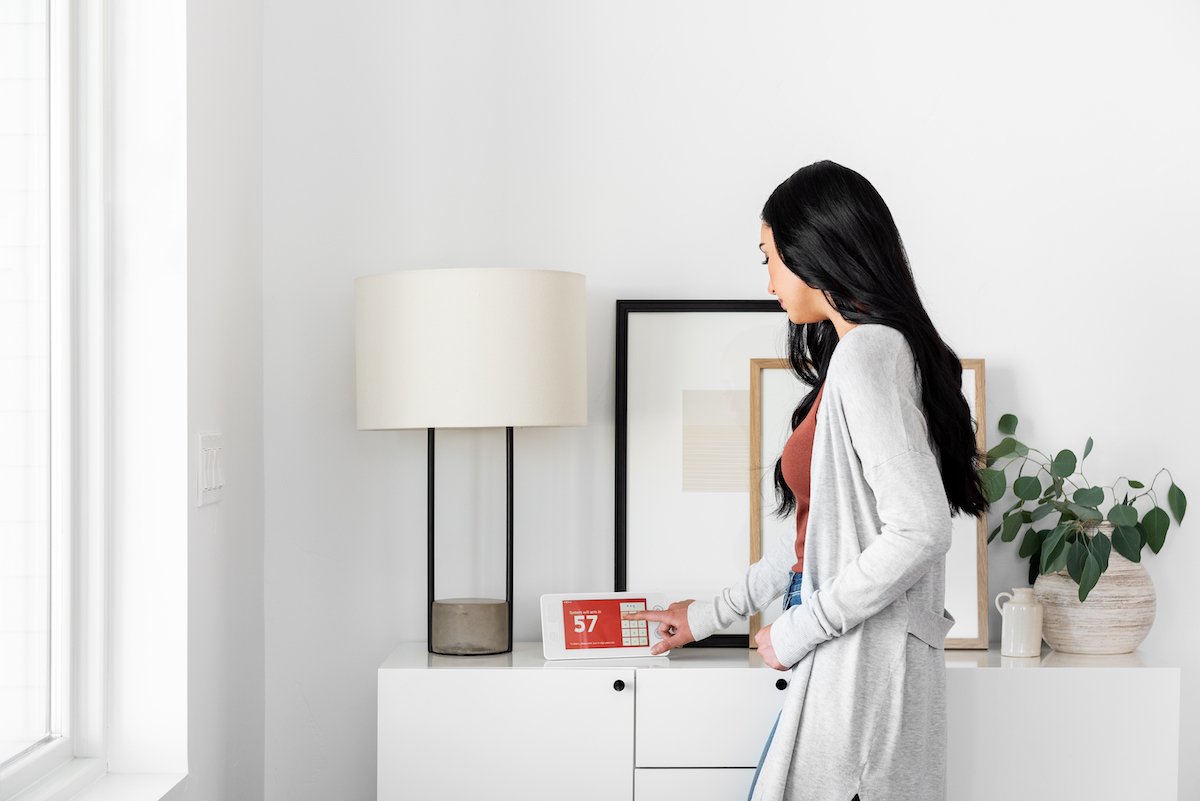
Burglarize Your Own Home
It may seem like an odd suggestion, however, burglarizing your own home can give you a new perspective on your home security and the level of protection that your home currently offers. What does it mean to burglarize your own home? This doesn’t mean that you should break down the door or bust a window. Instead, walk around your home and try to think like you’re a burglar. Try to imagine your first point of entry. Would you first try to pick the lock on the front door? Would you try all the windows on the first floor first and hope one was left unlocked?
Once you find your plan, react against it. If your first plan was to get through the front door, install door sensors and door alarms on the door frame. You could also replace the lock to make the lock harder to pick. Then plan to burglarize your home again.
Although this process may seem silly or repetitive, it helps to reveal weak access points in your home. By attempting to think like a burglar, you reveal where burglars are most likely to target your house, and then react before it becomes an issue.
Install Motion Sensor Floodlights
According to various studies, a majority of burglars will target homes in the daytime. Over 70 percent of burglars break into homes between the hours of 10 AM and 3 PM. During these daytime hours, homeowners are typically away at work and children are at school, making it likely that the homes will be entirely empty. Homeowners should work to prevent burglars from targeting their homes during the day by making it appear like the homeowner is present.
However, how can homeowners prevent burglars from targeting the house at night? One of the most effective ways to prevent nighttime burglary is by installing night vision cameras and a motion sensor floodlight. Floodlights or motion sensor porch lights are a helpful tool that can startle burglars away from the home. Burglars, as we established, don’t want to be caught. When caught in a stream of light at night, it’s likely that a neighbor will notice the suspicious activity. Most burglars, when they feel compromised, will leave the area quickly.
If you’re planning on buying a gun to further secure your home, it would still be a good idea to install a home security system, “burglarize” your home, and install motion sensor lights. Your protection and peace of mind are important, and these tips will only further secure your home.
Ready to get started?
Take this short quiz to build your customized system today!
Takes less than a minute

